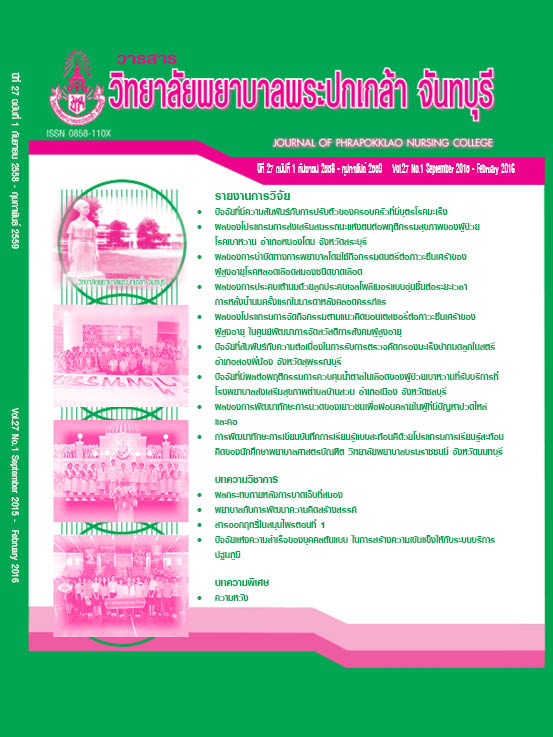The Effect of Montessori-based Activities Program on Depression among Older Persons in Social Welfare Development Center for Older Persons
Keywords:
Montessori-based activity program, Depression, Older personsAbstract
This experimental research aimed to determine the effect of Montessori-based activities program on depression among older persons at a social welfare development center for older persons. The samples consisted of 40 older persons with mild to moderate depression. An experimental group (n = 20) received Montessori-based activity program from August to November 2014; whereas, the control group (n = 20) received routine service. The samples were pair-matched by sex, age, and the depression level. The Montessori-based activity program based on Montessori-based (Montessori, 2011) was developed. The Thai Geriatric Depression Scale with Cronbach’s alpha reliability of .93 was used for data collection. Data were analyzed using frequency, percentage, paired t-test, and independent t-test.
The results of this study revealed that 1) for the experimental group, after the experiment, a mean score of depression was statistically significantly lower than that before the experiment (t = 14.233, p < .001); and 2) after the experiment, a mean score of depression of the experimental group was statistically significantly lower than that of the control group (t = 7.830, p < .001).
This study suggests that health care providers should apply this program to reduce depression in the older persons and help them conceive health as normal.
References
กนกพรรณ กรรณสูต. (2551). ประสิทธิภาพของการฝึกทักษะในการทำกิจวัตรประจำวันด้วยกิจกรรมแบบมอนเตสซอรี่ในผู้สูงอายุที่มีภาวะสมองเสื่อมระยะเริ่มแรก (วิทยานิพนธ์ปริญญามหาบัณฑิต). กรุงเทพฯ: จุฬาลงกรณ์มหาวิทยาลัย.
กรมสุขภาพจิต กระทรวงสาธารณสุข. (2549). จำนวนและอัตราผู้ป่วยทางสุขภาพจิตของประเทศไทยต่อประชากร 100,000 คน จำแนกรายจังหวัด ปี พ.ศ. 2549. สืบค้น วันที่ 19 พฤษภาคม 2557, จาก http://www.dmh.go.th/news/view.asp?id=1020
กลุ่มฟื้นฟูสมรรถภาพสมอง. (2537). แบบวัดความเศร้าในผู้สูงอายุของไทย. สารศิริราช, 46(1), 1-9.
กัลยพร นันทชัย. (2551). ประสิทธิภาพของการฝึกความจำด้วยกิจกรรมตามหลักปรัชญามอนเตสซอรี่ในผู้สูงอายุสมองเสื่อมระยะเริ่มแรก (วิทยานิพนธ์ปริญญามหาบัณฑิต). กรุงเทพฯ: จุฬาลงกรณ์มหาวิทยาลัย.
กัลยพร นันทชัย, และคณะ. (2554). คู่มือกิจกรรมตามหลักปรัชญามอนเตสซอรี่ฉบับ ผู้สูงอายุไทย. กรุงเทพฯ: บียอนด์พับลิสชิ่ง.
คําแก้ว ไกรสรพงษ์. (2545). การสอนตามหลักปรัชญามอนเตสซอรี่สำหรับเด็กที่มีความต้องการพิเศษ. กรุงเทพฯ: พีทีครีเอทีฟเฮ้าส์.
จตุรพร ศุกรนันทน์. (2553). ผลการเปรียบเทียบการให้คำปรึกษากลุ่มระหว่างทฤษฎียึดผู้รับคำปรึกษาเป็นศูนย์กลางกับการใช้ดนตรีบำบัดที่มีต่อภาวะซึมเศร้าของผู้สูงอายุในศูนย์พัฒนาการจัดสวัสดิการสังคมผู้สูงอายุ (วิทยานิพนธ์ปริญญามหาบัณฑิต). มหาวิทยาลัยมหาสารคาม.
จีระพันธุ์ พูลพัฒน์, และคําแก้ว ไกรสรพงษ์. (2544). คู่มือการสอนแบบมอนเตสซอรี่. กรุงเทพฯ: เดอะมาสเตอร์กรุ๊ป แมเนจเม้นท์.
มูลนิธิสถาบันวิจัยและพัฒนาผู้สูงอายุไทย. (2552). สถานการณ์ผู้สูงอายุไทย พ.ศ. 2551. กรุงเทพฯ: ทีคิวพี.
รวิวรรณ นิวาตพันธุ์, และคำแก้ว ไกรสรพงษ์. (2555). กิจกรรมของมอนเตสซอรี่กับผู้สูงอายุหลงลืม. กรุงเทพฯ: เอไซ (ประเทศไทย) มาร์เก็ตติ้ง.
ศิริรำไพ สุวัฒนคุปต์. (2555). การศึกษาเปรียบเทียบภาวะซึมเศร้าของผู้สูงอายุที่อยู่ในบ้านพักของตนเองและผู้สูงอายุที่อยู่ในบ้านพักคนชรา อำเภอเมือง จังหวัดเชียงใหม่ (วิทยานิพนธ์ปริญญามหาบัณฑิต). กรุงเทพฯ: จุฬาลงกรณ์มหาวิทยาลัย.
สถาบันเวชศาสตร์ผู้สูงอายุ กรมการแพทย์ กระทรวงสาธารณสุข. (2550). โครงการวิจัยการสำรวจและศึกษาภาวะสุขภาพของผู้สูงอายุ 4 ภาคของไทย. สืบค้น วันที่ 19 พฤษภาคม 2557, จาก http://static.agingthai.org/files/content/4regions.pdf
สมภพ เรืองตระกูล. (2542). ตำราจิตเวชศาสตร์ (พิมพ์ครั้งที่ 6). กรุงเทพฯ: โรงพิมพ์เรือนแก้วการพิมพ์.
สำนักงานเลขาธิการสภาการศึกษา กระทรวงศึกษาธิการ. (2550). การเรียนรู้ของเด็กปฐมวัยไทย: ตามแนวคิดมอนเตสซอรี่ (พิมพ์ครั้งที่ 2). กรุงเทพฯ: วี.ที.ซี. คอมมิวนิเคชั่น.
สุดสบาย จุลทัพพะ. (2552). ภาวะซึมเศร้าในผู้สูงอายุ. ใน ประเสริฐ อัสสันตชัย. (บ.ก.). ปัญหาสุขภาพที่พบบ่อยในผู้สูงอายุและการป้องกัน. หน้า 40-50. กรุงเทพฯ: ภาควิชาเวชศาสตร์ป้องกันและสังคม คณะแพทยศาสตร์ศิริราชพยาบาล มหาวิทยาลัยมหิดล.
สุวรรณา อรุณพงค์ไพศาล. (2543). อารมณ์ซึมเศร้าในผู้สูงอายุ. ศรีนครินทร์เวชสาร, 15(1), 23-27.
อวยพร เรืองตระกูล. (2550). สถิติประยุกต์ทางพฤติกรรมศาสตร์ I. กรุงเทพฯ: ภาควิชาวิจัยและจิตวิทยาการศึกษา คณะครุศาสตร์ จุฬาลงกรณ์มหาวิทยาลัย.
Barry, L. C., Allore, H. G., Guo, Z., Bruce, M. L., & Gill, T. M. (2008). Higher burden of depression among older women: The effect of onset, persistence, and mortality over time. Archives of General Psychiatry, 65(2), 172-178.
Beck, J. S. (2011). Cognitive behavior therapy: Basics and beyond (2nd ed.). New York: Guilford Press.
Camp, C. J., et al. (1997). An intergenerational program for persons with dementia using Montessori methods. The Gerontologist, 37(5), 688-692.
Camp, C. J., Orsulic-Jeras, S., Lee, M. M., & Judge, K. S. (2004). Effects of a Montessori-based intergenerational program on engagement and affect for adult day care clients with dementia. In Wykle, M. L., Whitehouse, P. J., & Morris, D. L. (Eds.). Successful aging through the life span: Intergenerational issues in health. pp. 159-176. New York: Springer.
Camp, C. J., & Skrajner, M. J. (2004). Resident-Assisted Montessori Programming (RAMP): Training persons with dementia to serve as group activity leaders. The Gerontologist, 44(3), 426-431.
Lin, L. C., Yang, M. H., Kao, C. C., Wu, S. C., Tang, S. H., & Lin, J. G. (2009). Using acupressure and Montessori-based activities to decrease agitation for residents with dementia: A cross-over trial. Journal of the American Geriatrics Society, 57(6), 1022-1029.
Montessori, M. (2011). Dr. Montessori’s own handbook. New York: Schocken Books.
National Institute for Health and Clinical Excellence. (2007). Depression (amended): Management of depression in primary and secondary care—NICE clinical guideline. Retrieved May 19, 2014, from http://www.leeds.ac.uk/lpop/Key%20Policy%20Documents/CG23NICEguidelineamended.pdf
Pirkis, J., et al. (2009). The community prevalence of depression in older Australians. Journal of Affective Disorders, 115(1-2), 54-61.
Rao, U. (2006). Links between depression and substance abuse in adolescents: Neurobiological mechanisms. American Journal of Preventive Medicine, 31(6 suppl. 1), s161-s174.
Rose, M. S., Camp, C. J., Skrajner, M. J., & Gorzelle, G. J. (2003). Enhancing the quality of nursing home visits with Montessori-based activities. Activities Directors’ Quarterly, 3, 4-10.
Tabachnick, B. G., & Fidell, I. S. (1996). Using multivariate statistics. New York: Harper Colins College.
Zhang, K., et al. (2009). The combined effects of the 5-HTTLPR and 5-HTR1A genes modulates the relationship between negative life events and major depressive disorder in a Chinese population. Journal of Affective Disorders, 114(1-3), 224-231.
Downloads
Published
How to Cite
Issue
Section
License
Copyright (c) 2016 Journal of Phrapokklao Nursing College

This work is licensed under a Creative Commons Attribution-NonCommercial-NoDerivatives 4.0 International License.
เนื้อความ ข้อมูล และรายการอ้างอิงที่ผู้เขียนใช้ในการเขียนบทความเพื่อลงตีพิมพ์ในวารสารวิทยาลัยพยาบาลพระปกเกล้า จันทบุรี ถือเป็นความคิดเห็นและความรับผิดชอบของผู้เขียน คณะผู้จัดทำวารสารไม่จำเป็นต้องเห็นพ้องด้วยหรือร่วมรับผิดชอบ
บทความที่ได้รับการลงตีพิมพ์ในวารสารวิทยาลัยพยาบาลพระปกเกล้า จันทบุรี ถือเป็นลิขสิทธิ์ของวารสารวิทยาลัยพยาบาลพระปกเกล้า จันทบุรี หากหน่วยงานหรือบุคคลใดต้องการนำส่วนหนึ่งหรือทั้งหมดของบทความไปเผยแพร่ต่อเพื่อวัตถุประสงค์ใด ๆ จะต้องได้รับอนุญาตจากบรรณาธิการวารสารก่อน



